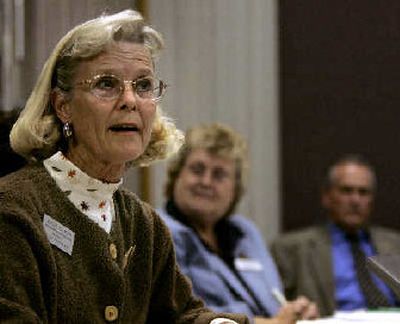Kansas school board OKs challenges to evolution

NEW YORK – In what some branded a significant attack on science, the Kansas State Board of Education adopted controversial new biology standards Tuesday that contain the harshest criticism of evolution in the nation and redefine science to go beyond natural explanations.
The new standards, to take effect in 2007, open the door to alternative explanations for the development of life on Earth that exceed traditional scientific limits of natural observation. Although not specifically named in the standards, such explanations might include creationism, the Biblical account of creation in Genesis, and intelligent design, which presents itself as a scientific theory that some aspects of life unexplained by evolution are best attributed to an unnamed and unseen intelligent designer.
The biggest battlefield in a spreading culture war waged by religious conservatives against modern views of Charles Darwin’s theory of biological evolution, Kansas has drawn national and international attention, and sometimes ridicule, for its sustained skirmishes over science standards in recent months.
Darwin’s theory, accepted as the cornerstone of modern biology by the majority of scientists, holds that all life on Earth, including humans, descended from a common ancestor and developed through the mechanisms of random mutation and natural selection. In scientific terms, a theory is not a guess, but the result of rigorous observation and testing over time.
Describing the new standards as a “significant attack” on science and evolution, Jack Krebs, a Kansas science teacher and president of Kansas Citizens for Science, said, “They have challenged the definition of science as seeking natural explanations. They have made it clear they would like to include supernatural explanations in science. They also included a large number of creationist arguments against evolution, arguments that are found in the creationist literature, but are not found in the mainstream literature.”
He added that the standards cast particular doubt on the concept of “common descent,” an idea repugnant to those who believe man was created in the image of God.
“This is a big victory for the students of Kansas, providing them with full-disclosure of the scientific debate about Darwinism going on between scientists and in the scientific literature, so we’re very pleased,” said Casey Luskin, program officer for public policy and legal affairs at the Discovery Institute’s Center for Science & Culture. The Discovery Institute is a Seattle-based think tank that promotes research on intelligent design, or ID, and has provided support for interested state and local education authorities, including Kansas’ state board.
Every major scientific organization in the United States has issued a statement opposing intelligent design as nonscientific and denying any debate over the validity of evolution.
Anticipating the board’s actions, the National Academy of Sciences and the National Science Teachers Association recently revoked permission for Kansas to use any of their copyrighted material in the state standards.
Due to the seesawing number of conservatives and moderates on the 10-person state education board, Kansas marks the second time in six years that the board has amended science standards to de-emphasize evolution in the high school curriculum.
In 1999, a conservative majority eliminated most references to evolution in the standards. A moderate majority reversed that in 2001 and it could happen again in 2006. But the current board, whose six conservatives – some of whom are avowed creationists – outvoted the four moderates, advocates harsh criticism of evolution.
Most disturbing to many scientists is the redefinition of science in the new standards to allow what many consider supernatural causes. Previously, science was defined as “The human activity of seeking natural explanations for what we observe in the world around us. These explanations are based on observations, experiments, and logical arguments that adhere to strict empirical standards and a healthy skeptical perspective.”
Under the new standards: “Science is a systematic method of continuing investigation, that uses observation, hypothesis testing, measurement, experimentation, logical argument and theory building to lead to more adequate explanations of natural phenomena.”